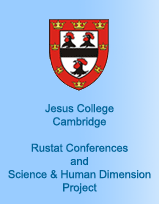

Rustat Report on Blockchain published
The report from the September 2016 Rustat Conference on Blockchain - Beyond Bitcoin is now published on the Rustat website.
Technology and AI Focus for Rustat Conferences in 2016
Machine Learning, Artificial Intelligence, the Blockchain and the Future of Work - these vital issues of today to feature in Rustat Conferences in 2016.
Rustat Conference Report on the UK North South Divide published
A diverse range of perspectives, opinions and policy suggestions appear in this new report from the UK North South Divide Rustat Conference - now available.
Big Data Analytics - Conference Report Published
The Rustat Conference on Big Data was held in collaboration with Cambridge Big Data Strategic Initiative on 30 September 2015 - report is now published.
Inequality - Rustat Conference Report
The proceedings of the March 2015 Inequality conference have been published on the Rustat website.
Transport & Energy Rustat Conference Report - November 2014
KPMG, Laing O'Rourke, McLaren, BP, Shell, HS2 and others tackled the most pressing UK transport and related energy questions.
Health Innovation: A Cambridge Success Story
The Rustat Conference on the development of the drug Campath-1H, entitled "Health Innovation: A Cambridge Success Story", took place at Jesus College on 29 January 2013. A report will be published shortly on the Rusat Conferences website.
Managing Organisational Change in the Economic Crisis
The Rustat Conference on Managing Organisational Change was held at Jesus College on 4 December 2012. The conference report is now available to download here.
The Future of Research-Intensive Universities
The sixth Rustat Conference discussed the future of research-intensive universities and was jointly hosted by the Vice-Chancellor of the University of Cambridge, Professor Sir Leszek Borysiewicz, and Professor Ian White, Master of Jesus College
Rustat Conference on UK Manufacturing
The fifth Rustat Conference was held at Jesus College, Cambridge, on 24 November 2011. Proceedings focused upon the challenges and opportunities facing the UK manufacturing sector. Chaired by Professor Ian White FREng, the conference featured contributions from leading figures from industry, government and academia.
Reductionism’s Primacy in the Natural Sciences
Science and Human Dimension 1991
Discoveries of new phenomena at successive levels in matter, living organisms, and mind-brain relationships have led to a more dynamic, emergent, relational view of nature. Are these trends undermining the successful reductionism that has served science and technology supremely well since the beginning of the 19th century? And to what extent is reductionist method shaping, and “reducing”, psychology, social studies, and even the humanities? Speakers included:
A number of publishers, writers and journalists attended the meeting, including Andrew Brown of The Guardian, John Wilkins, Editor of the Tablet, and Jerome Burne. The meeting concluded that reductionism has its limits, especially when applied to human behaviour and society. While areas of quantum physics appeared to defy traditional modes of reductionism, there was a need to defend reductionism as basic scientific method.
The proceedings are published in Nature’s Imagination: The Frontiers of Scientific Vision edited by John Cornwell, Oxford University Press, 1993.
- Nobel Prize Winner Gerald Edelman on Is it Possible to Construct a Perception Machine?
- Oliver Sacks on Neurology and the Soul
- Freeman Dyson on The Scientist as Rebel
- Roger Penrose on Must mathematical physics be reductionist?
- John D Barrow on Theories of Everything
- Paul M. Churchland and Patricia Churchland on Neurobiology of the Mind
- Mary Midgely on Reductionist Hubris
- Peter Atkins on The Limitless Power of Science
A number of publishers, writers and journalists attended the meeting, including Andrew Brown of The Guardian, John Wilkins, Editor of the Tablet, and Jerome Burne. The meeting concluded that reductionism has its limits, especially when applied to human behaviour and society. While areas of quantum physics appeared to defy traditional modes of reductionism, there was a need to defend reductionism as basic scientific method.
The proceedings are published in Nature’s Imagination: The Frontiers of Scientific Vision edited by John Cornwell, Oxford University Press, 1993.
